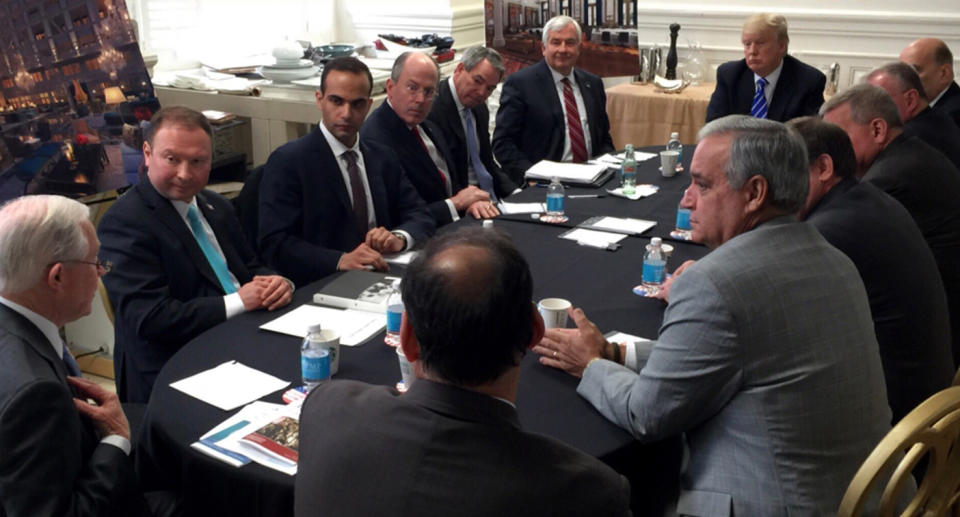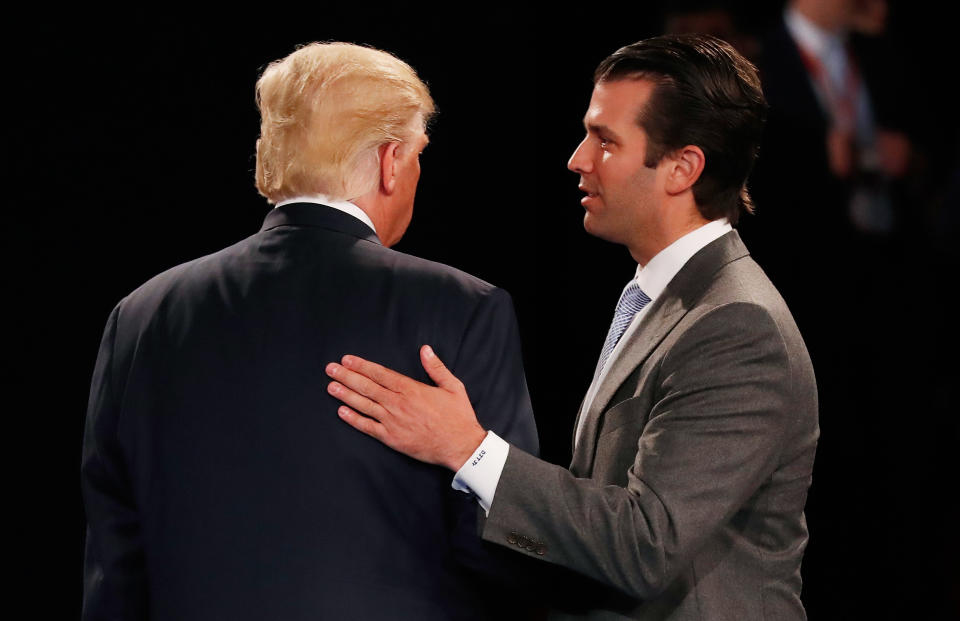What Mueller's questions for Trump reveal about the investigation
WASHINGTON — The highly detailed questions that special counsel Robert Mueller has drafted for a prospective interview with President Trump sharply reduce the chances the grilling will ever take place — and could pave the way for an epic legal confrontation over the Russian investigation that could eventually wind up before the Supreme Court.
That is big takeaway of some criminal defense lawyers and others close to the White House after Mueller’s proposed questions — which were presented last month to Trump’s legal team — were published Monday night by the New York Times. Trump called the leak of the questions “disgraceful.”
The open-ended nature of the questions and the broad list of topics signal the perils Trump would face in any interview with Mueller. News reports in recent months have speculated that the special counsel was focusing his investigation on possible obstruction of justice in the firing of former FBI Director James Comey. But the questions make it clear that Mueller is interested in much more: what the president knew about the notorious June 2016 Trump Tower meeting his son and top campaign officials had with Russian operatives; how much he was aware of efforts to broker a pre-election summit with Russian president Vladimir Putin; his business dealings in Russia; and whether he ever floated the idea of pardons to make sure some of his campaign underlings didn’t talk.
Under these circumstances, “There are very few lawyers who would not consider it legal malpractice to agree to an interview for the president,” said one former White House adviser to Trump, after reviewing the list of Mueller’s questions. “That is especially true knowing the temperament of this particular client, who has a tendency to say things that are contradicted by the facts.”
And in any interview, prosecutors would have a huge advantage over the president. Mueller’s office has obtained a wealth of subpoenaed documents about the president’s conduct and has taken secret testimony from cooperating witnesses — Michael Flynn, former foreign policy adviser George Papadopoulos and former campaign aide Rick Gates — any one of whom would be in a position to contradict Trump and expose him to perjury charges.

“The president has no real idea of the breadth of information known to Mueller,” said Solomon Wisenberg, a former federal prosecutor who served as a deputy independent counsel during Ken Starr’s investigation of Bill Clinton. “These questions just show [Trump’s former lawyer] John Dowd was completely justified by advising the president not to sit down for an interview. The peril is too great.”
That being the case, the most likely outcome at this point is that Trump refuses to submit to an interview, according to Wisenberg and the former White House adviser. Mueller would then have the option of issuing a subpoena to require the president’s testimony. If Trump continues to resist — on the grounds that Mueller, as an “inferior” officer of the executive branch, doesn’t have authority to require the president to do anything — the battle over Trump’s testimony would fall to the federal courts and ultimately, almost certainly, to the Supreme Court.
Many legal scholars believe that the president would ultimately lose that fight, based on the precedent set during Watergate when the Supreme Court ruled that President Nixon didn’t have the right to withhold White House tape recordings that were subpoenaed by then special prosecutor Leon Jaworski. But it’s not a slam dunk, and in either case, the president could “buy some time” and take his chances that this (more conservative) Supreme Court might be more sympathetic to his claims of executive powers and privilege, said the former adviser. “He’ll roll the dice,” the former adviser predicted.
In the meantime, the questions prepared by Mueller — combined with some nuggets buried in last week’s House Intelligence Committee report — offer some intriguing clues into the progress and direction of the special counsel’s probe. Here are a few of them.
1. Collusion is very much still on the table.
Much has already been made of Mueller’s proposed question to Trump: “What knowledge did you have of any outreach by your campaign, including by Paul Manafort, to Russia about potential assistance to the campaign?” The wording of the question suggests Mueller may well be aware of such “outreach,” presumably informed by the cooperation he has received from Manafort’s former deputy, Rick Gates. But other questions also point to additional evidence Mueller has gathered on the collusion front. One of them appears to involve the months-long effort by Papadopoulos to broker a meeting during the campaign between Trump and Putin. Papadopoulos first floated the idea of such a summit directly to Trump at a March 31, 2016, meeting of the then candidate’s newly appointed foreign policy advisory board. Jeff Sessions has testified he quickly shot the idea down. But as David Corn and I first disclosed in our book “Russian Roulette: The Inside Story of Putin’s War on America and the election of Donald Trump,” Papadopoulos secretly told Mueller’s prosecutors that Trump gave him the green light to pursue the summit idea, telling him he found the idea “interesting” and then looked to Sessions to follow up.

2. Potential witness tampering is also under scrutiny.
One of the more intriguing of Mueller’s proposed questions involve efforts by the president to communicate with his former national security adviser Michael Flynn after he was fired for lying to Vice President Mike Pence about his contacts with Russian ambassador Sergey Kislyak.
Mueller wants to ask the president, “What efforts were made to reach out to Mr. Flynn about seeking immunity or [a] possible pardon?” This question was likely prompted by a New York Times report that Trump lawyer Dowd floated the idea of a pardon to Flynn’s lawyer. But there may well be more to Trump’s contacts with Flynn after he left the White House than that. Last May, Yahoo News reported that Flynn told friends that he had recently been in touch with the president, who urged him to “stay strong” as the Russia investigation was closing in on him. Flynn, who pleaded guilty to lying to the FBI and is now cooperating with Mueller, would presumably know exactly what the president communicated to him. And what he communicated to the president, including during the campaign. One largely overlooked nugget buried in the House Intelligence Committee report released last week was that Flynn, the former Defense Intelligence Committee chief and his son met with Kislyak at the Russian ambassador’s residence in December 2015. That was shortly before Flynn flew off to Moscow to attend the 10th anniversary celebration of RT, the Russian government “propaganda station,” where he sat next to Putin at dinner. It was the first hint that Flynn had contact with Kislyak prior to Trump’s 2016 election.

3. Trump’s attempt to do business in Russia is on Mueller’s radar screen.
The questions that might be expected to most rile the president include two relating to his attempts to build a Trump Tower in Moscow — the first hard sign that the special counsel is probing Trump’s business operations.
One of the questions involves his communications with Aras Agalarov, the billionaire Russian oligarch who partnered with Trump to stage the Miss Universe pageant in Moscow in 2013. Trump and Agalarov signed a letter of intent to build a Trump-branded project in the Russian capital.
That deal collapsed after the Obama administration and the European Union imposed sanctions on Russian businesses following Putin’s 2014 annexation of Crimea and intervention in Ukraine. But Trump didn’t stop his efforts. Another Mueller question asks “what communications did you have with Michael D. Cohen [Trump’s longtime lawyer], Felix Sater [a former Trump real estate adviser] and others, including foreign nationals, about Russian real estate developments during the campaign?” This concerns a separate letter of intent to build a Trump Tower Moscow that was signed by Trump in October 2015 — while he was running for president. Trump’s real business partners in this deal were never clear. Russian tax records show that I.C. Expert Investment, the company with whom he signed the letter of intent, was owned by three murky offshore companies controlled by a Cypriot lawyer deeply involved in Russian finance. When Sater initially pitched the project to the Trump Organization, he pitched it as a way to boost Trump’s run for president. “I will get Putin on this program and we will get Donald elected,” Sater wrote in an email to Cohen at the time. “Buddy our boy can become president of the USA and we can engineer it. I will get all of Putin’s team to buy in on this, I will manage this process.”

4. What did the president know about the Trump Tower meeting — and when did he know it?
The June 9, 2016, meeting at Trump Tower — during which top Trump campaign officials sat down with a delegation of Russians after being told they were about to receive “official” and “sensitive” documents about Hillary Clinton from Kremlin files — remains a major focus for Mueller. Of all the questions on this topic, one leaps out: “When did you become aware of the Trump Tower meeting?” Trump and his son, Donald Trump Jr., have both said that Trump himself knew nothing about it at the time; Donald Jr. has said he only told his father much later, in the summer of 2017, shortly before it was revealed by the New York Times. But Rep. Adam Schiff, the ranking Democrat on the House Intelligence Committee, last week revealed that the panel failed to pursue leads that he believed might show otherwise. Trump Jr.’s phone records show that after receiving an email from Rob Goldstone, a publicist, informing him that Aras Agalarov and his son, the pop singer Emin Agalarov, were arranging to have the supposedly anti-Hillary documents brought to Trump Tower, the president’s son made two attempts by phone to reach the younger Agalarov in Moscow. Between those calls, according to Schiff, was a phone call to an individual with a blocked number. Noting that Trump himself had a number that was blocked, Schiff sought to have the president’s son’s phone records subpoenaed by the House committee — a request that was denied by the Republican majority — to determine if the recipient was the future president. But Mueller is operating under no such constraints — another reason why the Russian investigation poses such potential dangers for Trump.

_____
Read more from Yahoo News:
As House wraps up Russia inquiry, top Dem on Senate probe says there’s no end in sight
After relief debacle, Puerto Rico’s governor looks for political revenge in Florida
After a week of diplomacy, an Iran deal still seems out of reach
Photos: A look back at the work of slain AFP photojournalist Shah Marai killed in Kabul


